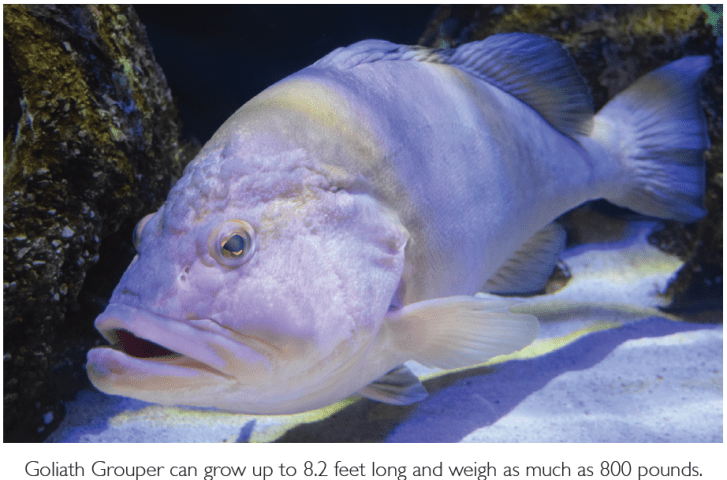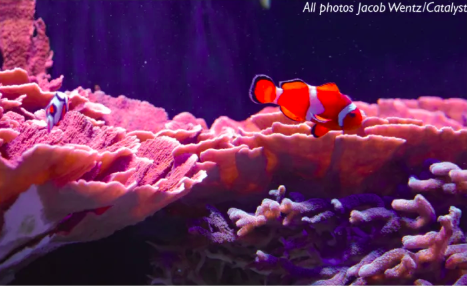
Driven by “research, education and excitement,” Mote Marine Laboratory and Aquarium offers various opportunities for interested students to expose themselves to marine species and ecosystems. Whether volunteering, interning or conducting research under the mentorship of professional scientists, Novos continue to strengthen New College’s relationship with Mote.
Volunteering
Mote’ volunteer group is currently composed of over 1,000 individuals, allowing those willing to commit their time the chance to connect with peers who share interests in the sea and its creatures. The organization also offers a special Summer High School Volunteer Program.
“Our most common volunteer opportunity is the docent position in the aquarium, so students who want to get some experience interacting with people and sharing information, that might be a really great opportunity,” Mote Student Engagement Coordinator Gina Santoianni said.
Second-year Antonia Ginsberg-Klemmt has been a volunteer since 2015.
“The great thing is that the Mote volunteer coordinators are very flexible with student schedules and are always more than happy to work with anyone who is willing to come help volunteer,” Ginsberg-Klemmt wrote in an email interview.

“During volunteer training and throughout my years with Mote, I’ve learned a lot about how Mote incorporates their wildlife and habitat rehabilitation efforts with research processes.”
Ginsberg-Klemmt, who studies Marine Engineering, plans on applying to become an intern so she can work with the aquarium’s plumbing and filtration systems, as they relate directly to her academic interests of discovering and creating different methods of generating electricity from hydropower. She advocates, however, that students are not required to study marine biology to volunteer.
“You don’t have to be a marine bio or any sort of marine AOC to gain something from volunteering there, so I would highly recommend volunteering at Mote to New College students and anyone interested,” Ginsberg-Klemmt said.
High school internships
In addition the High School Volunteer Program, Mote offers a High School Internship Program for students interested in marine biology, ocean conservation and structured research projects. First-year Madi Markham participated in this program from 2017 to 2019.

“The main research I did senior year was looking at the effect of Red Tide (Karenia brevis) blooms on benthic organisms,” Markham wrote in an email interview. “Specifically, we did stress tests on stone crabs out in Sarasota Bay and recorded collection data of small crabs and other benthic organisms found on hog hair filters we hung off the docks.”
Markham, who is interested in studying public policy, recognized the importance of the internship in developing general research skills.
“What I did at Mote was very different than what I’m going to do in my career, but the data collection and analysis skills I learned are very relevant,” Markham said. “I am really interested in environmental issues as a public policy student, so learning some of the science behind various climate and marine issues, as well as how to relay that information to the public, is really helpful to have.”
College internships and research
Perhaps most relevant to New College students, Mote offers a College Internship Program, currently with 20 research-related internships, four aquarium and animal care programs, three education programs and six support programs.

“Within the college internship, students can work in the lab under a research scientist,” Santoianni said. “Typically those students are working on a current project that is being led by their research mentor.”
Alum Daniel Niedospial (‘15) recently worked with Mote as an Ecotoxicology Intern, sampling water and clam tissue for long-term exposure to Karenia brevis, a harmful algal toxin that is largely responsible for the “Florida Red Tide.” Niedospial conducted his thesis on oysters and Red Tide, so the research at Mote was a logical next step.
“I took the position just before the major Red Tide bloom hit in August of 2018, so I was working with the only local team concerned with processing and analyzing hundreds of Red Tide samples on a weekly basis,” Niedospial said.
“Our measurements of bloom densities and toxin concentrations were used to consistently inform the FWC Beach Reports you’d check when wondering how bad it was at a moment’s notice.”
Niedospial now works as a full-time Research Assistant at the Roskamp Institute, spearheading a study regarding the health effects of Red Tide on humans. He maintains a strong relationship with Mote and continues to use some of their samples in his current research.
“Unlike the experiences of most scientists, my time interning at Mote was extremely immersive,” Niedospial said.
“Serving in the Ecotoxicology department during the worst Red Tide bloom in years, I knew the work I was doing was making a difference.”
In addition to the College Internship Program, Mote offers 10 Research Experience for Undergraduates (REU) positions for 10 weeks every summer.
“Within that program, students complete their own research project,” Santoianni said.
“They work under the mentorship of one of our research scientists and during that time they complete a project in the lab.”
For students interested in completing research with Mote during the Independent Study Project (ISP) term, opportunities are available, but for a longer commitment than one month.
“We don’t have the capacity to take on interns for that short of a time period, but if that person could commit to, say, starting their internship in January and then maybe continuing on through the semester, we might have some flexibility to do that,” Santoianni said.
Interested students can find more information about Mote’s educational and volunteer opportunities at mote.org

